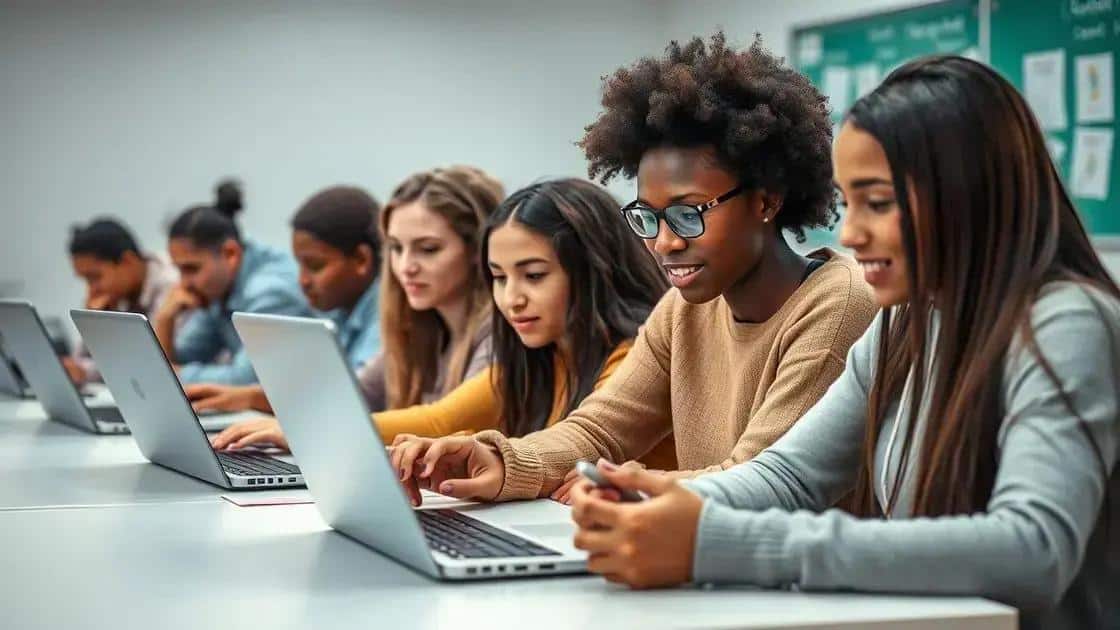Insights on ai tutoring programs that enhance learning

AI tutoring programs offer personalized learning experiences, immediate feedback, and improved engagement, making education more accessible and effective for students while addressing modern educational challenges.
Insights on ai tutoring programs reveal the transformative impact these technologies can have on education. Have you ever wondered how personalized learning can be enhanced by AI? Let’s explore.
Understanding ai tutoring programs
Understanding ai tutoring programs is crucial for anyone interested in the future of education. These innovative technologies are changing how students learn and receive support.
What are ai tutoring programs?
Ai tutoring programs are software solutions that use artificial intelligence to help students learn more effectively. They adapt to individual learning styles and needs, offering personalized support as students advance through their studies.
Key Features of ai tutoring programs
- Personalization: These programs adjust to the pace and style of the learner.
- Real-time feedback: Students receive immediate responses to their questions and actions.
- Engaging content: Many ai tutoring systems use interactive modules that keep students engaged.
- Flexible learning: Students can learn anytime and anywhere, making education more accessible.
Many students find it challenging to keep up with traditional teaching methods. However, ai tutoring programs can bridge this gap by providing support tailored specifically to each learner. By analyzing data from students’ interactions, these systems can identify strengths and weaknesses, allowing for targeted interventions.
Furthermore, the use of ai tutoring programs is not limited to academic subjects. They can also assist with skills development, such as improving writing or math abilities. The possibilities are vast and invite schools and parents to reconsider how education is delivered.
Incorporating ai tutoring solutions in classrooms can lead to better learning outcomes. Educators can focus on facilitating discussions and interactions while letting the program handle repetitive tasks and assessments. Ai tutoring programs can also assist teachers by providing insights into student performance, making intervention strategies more effective.
Benefits of ai tutoring for students

The benefits of ai tutoring for students are numerous and profound. These programs are designed to enhance learning experiences and provide personalized education tailored to each student’s needs.
Enhanced Learning Experience
One of the main advantages of ai tutoring is the enhanced learning experience it offers. By using artificial intelligence, these programs adapt to the learning pace of each student, providing a customized approach that traditional methods often lack.
Real-Time Feedback
Students receive instant feedback on their performance. This immediate response helps them understand concepts better and allows them to correct mistakes without delay. Unlike a classroom setting, where feedback can take time, ai tutoring ensures that learners stay on track.
- Personalized Pace: Students can learn at a speed that suits them best.
- Immediate Assistance: Help is available anytime, reducing frustration.
- Engagement: Interactive elements keep students more interested.
- Focus on Weaknesses: Programs identify areas needing improvement.
Moreover, ai tutoring increases engagement among students. The interactive nature of these programs makes learning fun and exciting, which is especially important for younger students. When they enjoy the learning process, they are more likely to participate actively and develop a love for learning.
In addition, ai tutoring can help bridge learning gaps for students who may struggle in traditional classroom environments. Those who may feel shy or hesitate to ask questions in class can benefit significantly from a non-judgmental ai tutor. This creates a safe space for them to ask questions and learn without fear of embarrassment.
Lastly, the support provided by ai tutoring programs can reinforce what students learn in school. They can use these tools to practice skills, review concepts, and receive additional resources tailored to their learning objectives. This support can lead to improved academic performance and increased confidence.
Challenges in implementing ai tutoring solutions
Implementing ai tutoring solutions comes with its own set of challenges that educators and institutions must navigate. Understanding these challenges is key to successful integration into the educational landscape.
High Initial Costs
One major barrier is the high initial costs associated with developing and deploying ai tutoring programs. These costs can include software development, purchasing hardware, and ongoing maintenance. Schools need to assess their budgets carefully before committing to such solutions.
Technology Integration
Another significant challenge is integrating ai tutoring solutions with existing educational systems. Often, schools have established methodologies and technologies in place. Transitioning to ai-based systems may require extensive training and adaptation.
- Staff Training: Teachers and staff must be trained to use new technologies effectively.
- Curriculum Adaptation: Existing lesson plans may need modification to incorporate ai tutoring.
- Technical Support: Ongoing technical assistance is crucial for resolving issues that may arise.
- Resistance to Change: Participants may be resistant to adopting new methods due to comfort with traditional practices.
Moreover, concerns about data privacy and security are increasingly prominent. Schools must ensure that any data collected by ai tutoring systems is protected, as students’ personal information is sensitive. Implementing appropriate security measures is vital to gaining the trust of parents and students.
Another issue is ensuring that ai tutoring solutions are accessible to all students. Not every student has the same access to technology or the internet, creating potential inequities. Schools must find ways to provide equal access to these innovative tools.
Lastly, while artificial intelligence has the potential to enhance learning, it cannot replace the invaluable human touch in education. Teachers play a crucial role in a student’s social and emotional development, which ai tutoring cannot replicate. Finding a balance between technology and traditional teaching is essential.
Future trends in ai tutoring technology

The future trends in ai tutoring technology are promising and exciting. As we advance, we can expect several innovative developments that will further enhance the educational landscape.
Increased Personalization
One major trend is the move towards even greater personalization. Ai tutoring systems will increasingly use data analytics to understand individual learning patterns, preferences, and strengths. This will allow these programs to provide tailored content to each student based on their unique needs.
Integration with Virtual and Augmented Reality
Another emerging trend is the integration of virtual and augmented reality in ai tutoring. These technologies will create immersive learning experiences, enabling students to engage with the material in more interactive ways. For example, learning about historical events may involve virtual field trips to historical sites, while science lessons could include virtual labs.
- Real-world Simulations: Students can practice skills in simulated environments.
- Collaborative Learning: Enhanced interaction between students in virtual spaces.
- Engagement: More engaging learning environments to motivate students.
- Accessibility: Learning experiences can reach students from diverse locations.
Additionally, the use of ai-driven analytics will continue to grow. Educators will be able to track student progress more effectively and identify areas where students struggle. This will allow for timely interventions, ensuring that learners receive the support they need.
Moreover, the future may see increased collaboration between ai tutoring programs and traditional educational institutions. Schools will likely implement blended learning approaches that integrate ai tutoring within classroom settings, combining the benefits of technology with the personal touch of teachers. This hybrid model ensures that students can benefit from both tailored learning experiences and social interactions with peers.
Finally, as technology advances, we may witness improved accessibility for all students. This includes efforts to ensure that students with disabilities can benefit from ai tutoring solutions. Developing adaptive tools and technologies will be crucial in making education equitable for everyone.
FAQ – Frequently Asked Questions about AI Tutoring Programs
What are AI tutoring programs?
AI tutoring programs are educational tools that use artificial intelligence to personalize learning experiences for students.
How can AI tutoring benefit students?
AI tutoring provides personalized learning, immediate feedback, and engages students in a more interactive way to improve their learning outcomes.
What challenges exist in implementing AI tutoring solutions?
Challenges include high initial costs, the need for technology integration, concerns about data privacy, and ensuring accessibility for all students.
What is the future of AI tutoring technology?
The future includes increased personalization, integration with virtual reality, improved analytics, and greater collaboration with traditional teaching methods.





